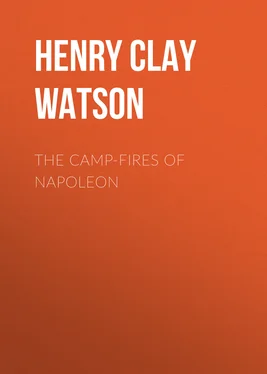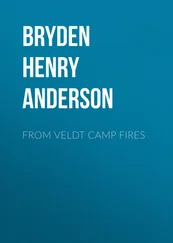Henry Clay Watson - The Camp-fires of Napoleon
Здесь есть возможность читать онлайн «Henry Clay Watson - The Camp-fires of Napoleon» — ознакомительный отрывок электронной книги совершенно бесплатно, а после прочтения отрывка купить полную версию. В некоторых случаях можно слушать аудио, скачать через торрент в формате fb2 и присутствует краткое содержание. Жанр: foreign_prose, foreign_antique, на английском языке. Описание произведения, (предисловие) а так же отзывы посетителей доступны на портале библиотеки ЛибКат.
- Название:The Camp-fires of Napoleon
- Автор:
- Жанр:
- Год:неизвестен
- ISBN:нет данных
- Рейтинг книги:4 / 5. Голосов: 1
-
Избранное:Добавить в избранное
- Отзывы:
-
Ваша оценка:
- 80
- 1
- 2
- 3
- 4
- 5
The Camp-fires of Napoleon: краткое содержание, описание и аннотация
Предлагаем к чтению аннотацию, описание, краткое содержание или предисловие (зависит от того, что написал сам автор книги «The Camp-fires of Napoleon»). Если вы не нашли необходимую информацию о книге — напишите в комментариях, мы постараемся отыскать её.
The Camp-fires of Napoleon — читать онлайн ознакомительный отрывок
Ниже представлен текст книги, разбитый по страницам. Система сохранения места последней прочитанной страницы, позволяет с удобством читать онлайн бесплатно книгу «The Camp-fires of Napoleon», без необходимости каждый раз заново искать на чём Вы остановились. Поставьте закладку, и сможете в любой момент перейти на страницу, на которой закончили чтение.
Интервал:
Закладка:
That night, the first time for five days, Bonaparte enjoyed the sweets of repose. The anxiety was at an end—Italy was his own.
THE CAMP-FIRE AT ARCOLA
The indomitable Bonaparte had nearly destroyed the army of Wurmser. The laurels of Roveredo, Bassano, and Saint George, adorned his young brow, beside those of Monte Notte, Lodi and Castiglione. Within ten days, he had carried positions, the natural difficulties of which seemed to defy human assault, killed or captured about twenty thousand men, and taken artillery and stores which were almost an encumbrance to his gallant little army. His brave officers, Massena, Augereau, Bessieres, Murat, Berthier, Lannes, and the rest, had heaped up their titles to immortal renown. To use the language of Thiers, “France was lost in admiration of the commander-in-chief of the army of Italy.”
Still, Bonaparte’s situation was rapidly becoming one of startling peril. Austria redoubled her efforts to recover Lombardy. A fine army was prepared from the wrecks of Wurmser, the troops from Poland and Turkey, the detachments from the Rhine, and fresh recruits. Marshal Alvinzi was appointed to the command. Bonaparte’s army at this time numbered about thirty thousand men, but they were badly provided, while Alvinzi could bring sixty thousand men into the field. On the 1st of November, 1796, the Austrian commander advanced upon the Brenta. At first, the French fell back, but Bonaparte resolved to strike a blow at the onset of this new series of movements, which would break the spirit of the enemy. The action took place on the 5th, between Carmignano and Bassano, and after a hot and bloody conflict, the French were victorious. Other contests followed; but in spite of the advantages gained by Bonaparte, he found that unless a great decisive battle was fought, Italy would be lost. The troops began to murmur at the neglect with which their government treated them, and the general complained to the Directory that the majority of his best officers were either killed or disabled by wounds. But in the meantime, Bonaparte conceived a daring plan of action, which, considering the circumstances, stands unparalleled in the annals of war. He resolved to give battle, unexpectedly, amid the marshes of the Adige, where the difference in numbers would be neutralized. Then followed the tremendous battle of Arcola, which lasted seventy-two hours, and ended in the complete triumph of the French.
It was the night of the 17th of November. The sun had set upon a third day of slaughter amid the marshes and upon the plain at Arcola. But with the quiet shadows of evening, came victory to gladden the hearts of the French and their glorious general. Exhausted by the terrible conflict, both armies were to pass the night upon the plain. But the Austrians took care to be beyond the reach of the conquerors and far towards Vicenza. The French kindled their camp-fires upon the field of their triumph. It was a gloomy night. Neither moon nor star smiled in the sky; and the line of the encampments could only be traced by the fires, blazing even among the heaps of the dead, while far away over the plain the long line of Austrian fires could be distinguished. Having partaken of some slight refreshment, the French soldiers were stretched upon the ground around the fires. The majority slept. But to some, wearied as they were in body, sleep would not come, so excited were their minds by the vivid and terrible images of the conflict through which they had passed. The Guides, who had kindled their fires around a little cottage in which Bonaparte had taken quarters for the night, were among the wakeful ones. They had secured for themselves, at the order of the commander-in-chief, abundant refreshments, and now, sitting upon their camp-stools to rest their weary limbs, they discussed both the provision and the glorious achievements of the army of Italy. Their number had been considerably thinned by the great battle through which they had just passed, for they, as well as their general, had been in the thickest of the fire. But there were still Bessieres, the commander, young Lemarois, Duroc, and others of distinction; while among them was, Augereau, who, having been reared in the democratic faubourg St. Antoine, never had any scruples upon the subject of rank, outside of actual military operations. He associated with general and private upon equal terms. The others doubtless considered themselves as honoring the company with their presence; but they could not have formed a part of a more gallant group. Not an officer among them but bore marks of the terrible conflict through which they had passed. Their costume was bespattered with mud, their faces blackened with powder, and some of them had sabre wounds, which, for the time, disfigured their countenances.
“The officers of the army have suffered dreadfully, during these three days of fighting,” said Augereau. “I thought that before the battle we were crippled enough in that way; but only look now. Here’s General Lannes, who was wounded before he went into the conflict, and he now lies low with three more wounds. Verne, Bon, Verdier, and several others are also wounded, while General Robert and the brave Colonel Muiron, who saved General Bonaparte’s life at Toulon, and covered him here again, are killed.”
“This battle will long be deemed a glorious monument of the genius of Bonaparte,” said Bessieres, “I say it with deference, that heroic as are his principal officers, they might have striven in vain against the superior numbers of the enemy, but for the daring and profound combinations of the general-in-chief, while much is also due to his efforts of resolute valor during the struggle.”
“No one will venture to deny that,” said the frank and generous Augereau. Massena merely nodded his head, but left the meaning of the nod unexplained.
“For,” continued Bessieres, “consider the position of the army before the battle. Our army was greatly inferior in numbers to that of Alvinzi, as, in spite of the immense loss of the Austrians, it remains. Our hospitals were full of sick and wounded. The troops were dispirited, because of the shameful neglect with which their government treated them. A large number of our best officers were entirely disabled. Yet an address from General Bonaparte restored confidence to the army, and when, on the night of the 15th, orders were given to the troops to fall back, they obeyed with alacrity, although they believed they were retreating—a movement to which they are unaccustomed, for they supposed that some daring plan had been formed for their glory. When they had recrossed the Adige by the bridge of boats here at Ronco, they found that their confidence in their general had not been misplaced.”
“See then,” said Duroc, “how General Bonaparte availed himself of the advantages of the ground. What other general of this age would have thought of fighting among the marshes. Alvinzi was encamped on the road from Verona to the Brenta. Consequently when General Bonaparte reached Ronco, he found himself brought back on the flanks and nearly on the rear of the Austrians. The army was then amidst extensive marshes, traversed by two causeways, which we were ordered to occupy.
“Now mark the result of his calculations; amidst these marshes numerical advantage was neutralized; there was no deploying but upon the causeways, and on the causeways the courage of the advanced guards of the columns would decide the event. By the causeway on the left, which communicated with the road between Verona and Caldiero, he could fall upon the Austrians if they attempted to scale Verona. By the causeway on the right, which crossed the Alpon at the bridge of Arcola, and terminated at Villa Nova, he might debouch upon the rear of Alvinzi, take his artillery and baggage, and cut off his retreat. He was therefore impregnable at Ronco, and he stretched his two arms around the enemy. He had caused the gates at Verona to be shut, and had left Kilmaine there, with fifteen hundred men, to stand a first assault. This combination, so daring and so profound, struck the army, and inspired them with confidence.”
Читать дальшеИнтервал:
Закладка:
Похожие книги на «The Camp-fires of Napoleon»
Представляем Вашему вниманию похожие книги на «The Camp-fires of Napoleon» списком для выбора. Мы отобрали схожую по названию и смыслу литературу в надежде предоставить читателям больше вариантов отыскать новые, интересные, ещё непрочитанные произведения.
Обсуждение, отзывы о книге «The Camp-fires of Napoleon» и просто собственные мнения читателей. Оставьте ваши комментарии, напишите, что Вы думаете о произведении, его смысле или главных героях. Укажите что конкретно понравилось, а что нет, и почему Вы так считаете.












